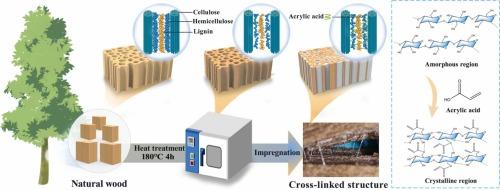Industrial Crops and Products ( IF 5.6 ) Pub Date : 2024-09-17 , DOI: 10.1016/j.indcrop.2024.119657 Xin Ma, Yuan Zhang, Ping Li, Ya Zhou, Jiali Yang, Yingfeng Zuo

|
Traditional wood modification methods often result in the release of harmful substances and energy wastage. This study proposes an efficient and environmentally friendly modification strategy for fast-growing poplar wood. The approach involves polymerizing organic linear molecules within the cell wall to form stitches, thereby enhancing the dimensional stability and mechanical properties of wood and increasing its ability to withstand various environments. Poplar wood specimens were treated via a method that combines heat treatment with acrylic emulsion impregnation. The research findings indicated an improvement in the mechanical properties of poplar wood following the combined treatment. Moreover, poplar wood subjected to this treatment approach exhibited a 35.24 % lower water absorption rate after a 7-day water immersion test, and tangential and radial swelling rates of the wood were reduced by 29.66 % and 45.68 %, respectively. Scanning electron microscopy revealed excellent penetration of acrylic emulsion into wood cells; the emulsion infiltrated the wood and adhered to the cell walls, forming a crosslinked network structure. Analysis of the modification mechanism through X-ray diffraction, Fourier-transform infrared spectroscopy, and X-ray photoelectron spectroscopy showed that the successful infusion of acrylic emulsion compensated for the lower mechanical properties of thermally treated wood, thus improving the utilization value of poplar. The acrylic emulsion is an environmentally friendly and harmless modifier, making the modified wood suitable for various applications, including indoor furniture, logistics, and outdoor facilities. This modification strategy enables efficient resource utilization and provides valuable insights for the sustainable development of the timber industry.
中文翻译:

细胞壁钉合的环保策略:在热处理杨木中浸渍丙烯酸乳液的原位交联
传统的木材改性方法往往会导致有害物质的释放和能源的浪费。本研究提出了一种针对速生杨木的高效且环保的改性策略。该方法涉及聚合细胞壁内的有机线性分子以形成缝线,从而增强木材的尺寸稳定性和机械性能,并提高其承受各种环境的能力。采用热处理与丙烯酸乳液浸渍相结合的方法对杨木标本进行处理。研究结果表明,经过联合处理后,杨木的机械性能得到了改善。此外,经过7天的浸水试验,经过该处理方法的杨木吸水率降低了35.24%,木材的切向和径向膨胀率分别降低了29.66%和45.68%。扫描电子显微镜显示丙烯酸乳液对木材细胞具有良好的渗透性;乳液渗透木材并粘附在细胞壁上,形成交联网络结构。通过X射线衍射、傅里叶变换红外光谱和X射线光电子能谱分析改性机理表明,丙烯酸乳液的成功注入弥补了热处理木材较低的力学性能,从而提高了杨木的利用价值。丙烯酸乳液是一种环保无害的改性剂,使改性木材适用于各种应用,包括室内家具、物流和户外设施。 这种改造策略实现了资源的高效利用,为木材工业的可持续发展提供了宝贵的见解。































 京公网安备 11010802027423号
京公网安备 11010802027423号